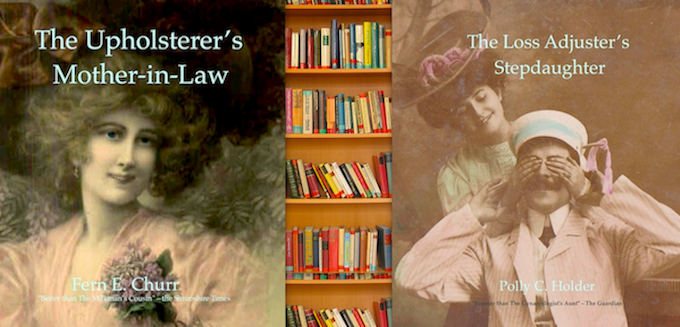Have you read The Milkman’s Fiancée or The Lion Tamer’s Great-Grandfather? And what’s happening to book titles? Tony Barrell investigates
MAY 2015
Imagine you’ve had a brilliant idea for a novel, and you’re dying to sell it to a publisher, but you’re stuck for a title. Titles aren’t easy. The best ones sound classic and vital, as if they’ve existed for ever – Gone With the Wind, Brave New World, To Kill a Mockingbird – while the mediocre ones (no examples of which come to mind) slip gently into obscurity.
But now there’s a simple solution for novelists everywhere. Is there a person in your book who has a definite job? Maybe there’s a brain surgeon or a racing driver in there, or a hairdresser or estate agent? Most characters in novels have jobs of some kind. Good – you’ve found one. Now make a family connection with that character – find a relative of that working person who could be a key figure in the book. Does the hairdresser have a cousin, for example? There you go – The Hairdresser’s Cousin. Or does the estate agent have an uncle? The Estate Agent’s Uncle. Job done.
There’s an infection spreading in the publishing industry at the moment, and these job/relative books are proliferating like Japanese knotweed in an abandoned garden. If you choose, you can now read about The Beekeeper’s Daughter (by Santa Montefiore), The Taxi Driver’s Daughter (Julia Darling), The Taxidermist’s Daughter (Kate Mosse), The Fisherman’s Daughter (Molly Jackson), The Fisherman’s Son (Michael Koepf), The Zookeeper’s Wife (Diane Ackerman), The Weatherman’s Niece (Manda Benson) and The Shepherd’s Granddaughter (Anne Laurel Carter).
There are four entirely different novels, by different authors, called The Apothecary’s Daughter
And with so many occupations and family members to choose from, you’d think that authors and publishers would have an enormous scope for creativity here. The “joblative” book, as I have decided to christen it, is a wide-open field, with thousands of interesting title possibilities up for grabs. So why are there four entirely different novels, by different authors, called The Apothecary’s Daughter? There’s one by Charlotte Betts, another by Julie Klassen, and two more by Patricia Schonstein and Lucy Appleby. They’re all about the female child of an apothecary. Did three of those authors (and their publishers) not test their title on Amazon when they thought of it? “Apothecary” isn’t even a great choice, being a job that people don’t tend to have these days, and a word that many people don’t know. I mean, I haven’t had cause to visit the apothecary in my local High Street for nigh on seventeen twelvemonths. That clearly hasn’t bothered Diane Scott Lewis, who gives us The Apothecary’s Widow, just for a bit of a change.
The joblative craze isn’t just the product of one publisher. These books range across the industry, involving companies like Penguin, Simon & Schuster, Bloomsbury, Orion, and Mills & Boon. But some authors are repeat offenders. Dinah Jefferies has given us both The Tea Planter’s Wife and The Silk Merchant’s Daughter, while June Francis is responsible for both The Pawnbroker’s Niece and The Adventurer’s Bride. To be fair, June has pushed the boundaries a little here, with “Adventurer”, because that’s not really a proper job, one that you see on people’s CVs or you see advertisements for (“Situation vacant: full-time adventurer. Must have a passport and be rather adventurous”). The same applies to The Kingmaker’s Daughter by Philippa Gregory, and to The Murderer’s Daughter by Jonathan Kellerman: although murdering does sometimes come with a contract, it isn’t really a proper, decent job, not like shepherding or zookeeping.
But that’s okay: it’s important to note that one of the seeds of the current joblative profusion, 10 years ago, was The Time Traveler’s Wife by Audrey Niffenegger, and “Time Traveler” isn’t usually a real job either. Not yet, anyway. (Aahhhhh…)
At any moment, I’m expecting blockbusters like The Greengrocer’s Ex-Boyfriend or The Acupuncturist’s Tart
The Joblative Award surely goes to the author Alexandra Connor, who has written at least four joblative books: The Jeweller’s Niece, The Tailor’s Wife, The Watchman’s Daughter, and The Soldier’s Woman. Alexandra has also extended the idea there, with “Woman” – that’s not really a proper relative, even if the Soldier has had repeated carnal relations with her. But that’s all right, too, because these authors and their publishers are inventing and breaking the rules as they go along. It’s their prerogative. So at any moment, I’m expecting blockbusters like The Greengrocer’s Ex-Boyfriend or The Acupuncturist’s Tart. I’m looking forward to those.
So who started all this? I can’t blame Audrey Niffenegger, because there are earlier books whose titles follow the joblative formula. My research turned up The Warden’s Niece by Gillian Avery, which was published way back in 1959. From that same year comes a book featuring the fictional American attorney Perry Mason, called The Case of the Sleepwalker’s Niece, by Erle Stanley Gardner.
However, in 1955, four years before the Warden, the Sleepwalker and their respective Nieces, came a book by C S Lewis – a prequel to his Narnia books – called The Magician’s Nephew. Was it clever old Clive Staples Lewis who kicked all this off?
I’m still searching through the annals of publishing for an earlier example. In the meantime, do let me know if you find one. And publishers, please stop it – now. ♦
© 2015 Tony Barrell
Tony Barrell has been published by HarperCollins, Omnibus Press, ACC Art Books, Iconic Images and Godknowswhoelse.









Chaucer had The Canon’s Yeoman’s Tale (14th Century), although not technically a relative I guess.
Thanks, Simon. I think it comes close!